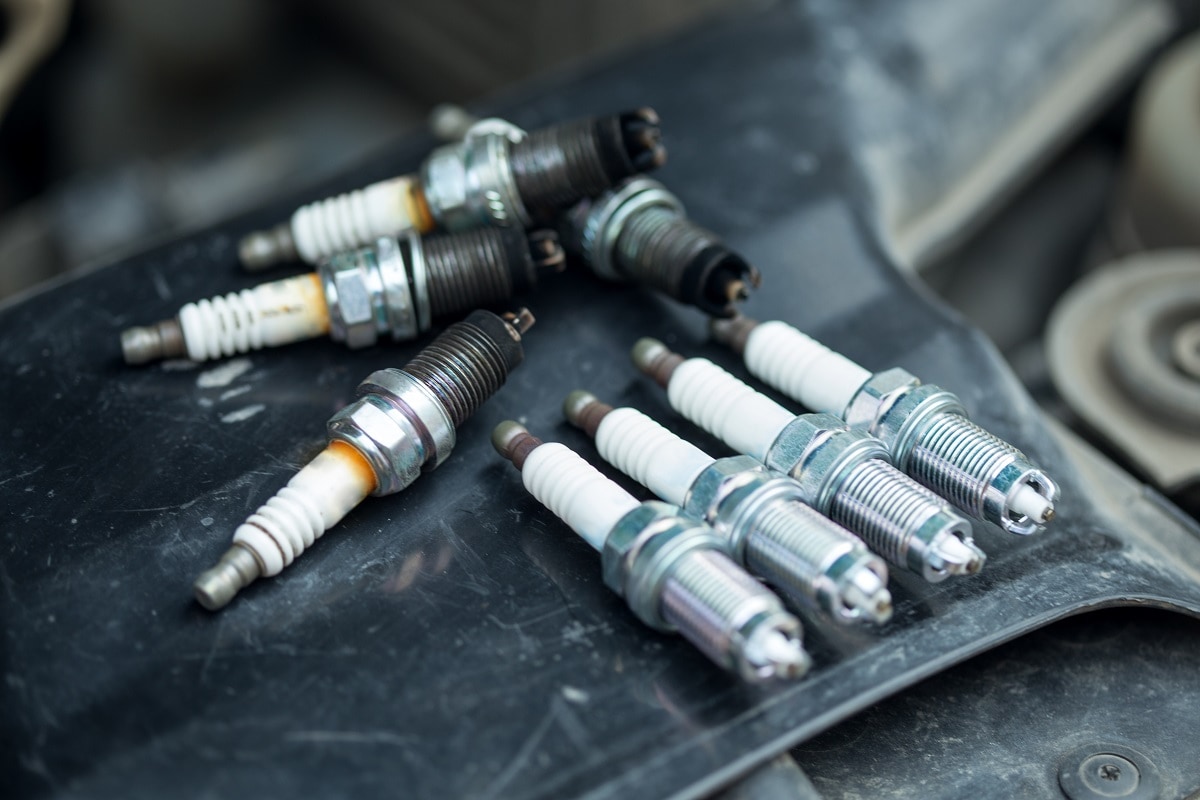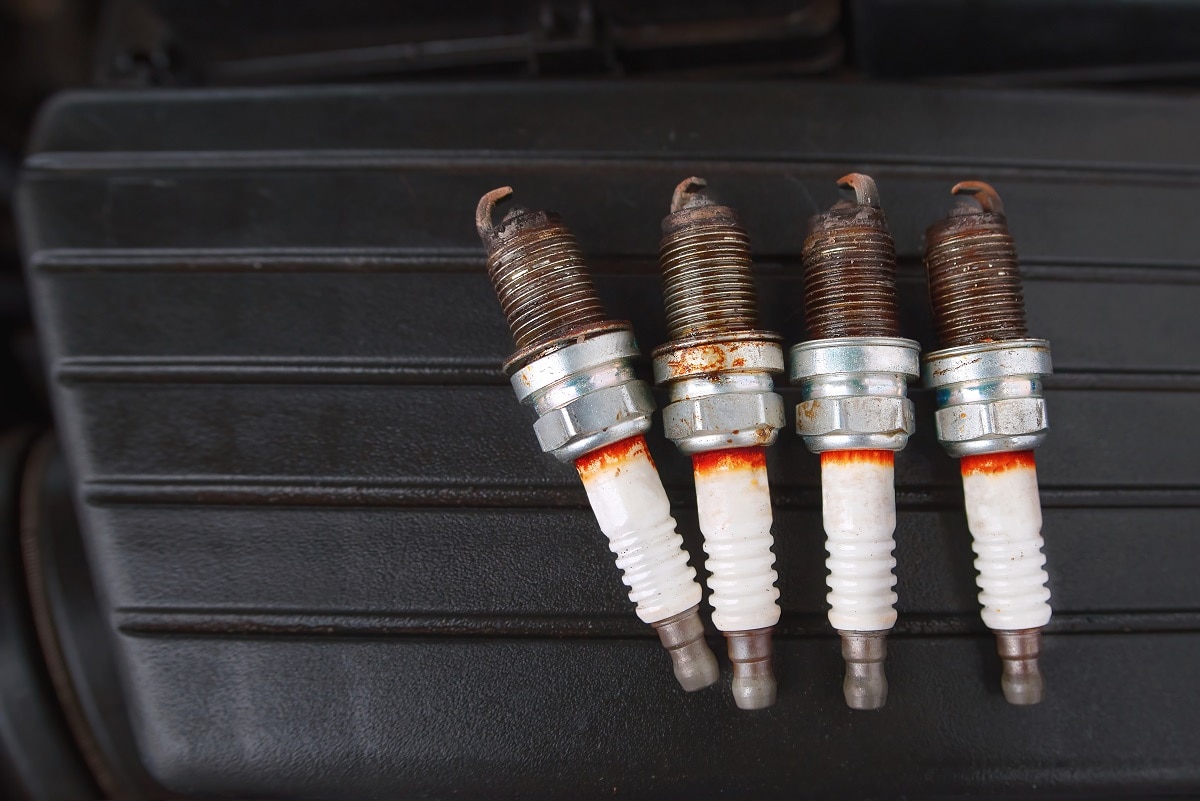
Like Mighty Mouse or Paul Rudd, spark plugs are small yet ferocious buggers. They play a critical role in... making sparks. But what exactly are they? How do they function? And when should you replace them? In this comprehensive FAQ guide, we'll cover everything you could ever wonder about spark plugs, from their basic anatomy and working principles to signs of trouble and proper maintenance. Class is in session.
What is a spark plug & how does it work?
A spark plug is a crucial component in internal combustion engines that produces the electric spark needed to ignite the air-fuel mixture in the combustion chamber. It consists of a metal shell, an insulator, a center electrode, and a ground electrode. The spark plug is installed in the cylinder head and is responsible for creating the spark that initiates combustion.
The spark plug operates by generating an electrical spark across a small gap between the center electrode and the ground electrode. When the electrical current flows from the ignition system through the center electrode, it creates a high voltage. This high voltage ionizes the air and fuel mixture in the gap, creating a spark that ignites the mixture and initiates the combustion process. It continuously repeats this process to provide the necessary spark for each combustion cycle.
What are the parts of a spark plug?
A spark plug consists of several components. The metal shell serves as the outer body of the spark plug and provides electrical grounding. The insulator is a ceramic piece that isolates the high voltage of the center electrode from the shell. The center electrode extends into the combustion chamber and conducts the electrical current. The ground electrode is positioned adjacent to the center electrode and helps create the spark gap.
What are the different types of spark plugs?
There are various types of spark plugs available, each designed for specific engine applications and performance requirements. The common types include:
- Copper spark plugs: These are the traditional spark plugs with a copper core. They provide good conductivity but have a shorter lifespan compared to other types.
- Platinum spark plugs: These feature a platinum disc welded to the center electrode. Platinum plugs offer increased durability and a longer lifespan than copper plugs.
- Iridium spark plugs: Iridium plugs have an even finer electrode made of iridium. They offer excellent longevity and performance, making them popular in modern engines.
- Double platinum spark plugs: These plugs have platinum electrodes on both the center and ground electrodes, providing extended durability and improved ignition.
- Ruthenium spark plugs: Ruthenium plugs are a newer type that combines the advantages of platinum and iridium plugs, offering excellent performance and durability.
- Multi-ground electrode spark plugs: These plugs feature multiple ground electrodes, which can enhance combustion efficiency and provide better spark distribution.
- Performance spark plugs: Designed for high-performance engines, these plugs may have unique electrode designs or materials to improve combustion and power.
For more information about spark plug differences, you should speak with your auto service technician.
What are the signs of a loose or bad spark plug?
There are numerous warning signs that you need new spark plugs. The most common loose and bad spark plug symptoms include:
- Engine misfires or runs rough: A worn or dead spark plug may not ignite the air-fuel mixture correctly, leading to engine misfires, rough idling, or a decrease in performance.
- Difficulties starting the engine: If the spark plug is loose or fails to produce a strong spark, starting the engine may become more challenging, resulting in prolonged cranking or no start at all.
- Reduced fuel efficiency: A poorly functioning spark plug can result in incomplete combustion, leading to decreased fuel efficiency and increased fuel consumption.
- Engine surges or hesitates: When a spark plug is malfunctioning, the engine may surge or hesitate during acceleration, indicating a potential spark-related issue.
- Increased exhaust emissions: A bad spark plug can contribute to higher levels of harmful emissions, such as carbon monoxide and hydrocarbons, leading to a failed emissions test or increased environmental impact.
What causes spark plugs to foul?
Spark plugs can become fouled due to various reasons, including:
- Carbon buildup: Over time, carbon deposits can accumulate on the spark plug electrodes, reducing the spark's effectiveness and potentially causing fouling.
- Oil leakage: If engine oil finds its way into the combustion chamber, it can coat the spark plug, leading to fouling. This can occur due to worn piston rings, valve stem seals, or other internal engine issues.
- Rich fuel mixture: A fuel mixture that contains excessive fuel or inadequate air can cause incomplete combustion, leading to fouled spark plugs.
- Driving conditions: Extended periods of idling, short trips, or stop-and-go driving can contribute to spark plug fouling as the engine may not reach optimal operating temperatures for efficient combustion.
- Long intervals between maintenance: Neglecting spark plug replacement at recommended intervals can increase the likelihood of fouling, as worn or aged spark plugs are more prone to deposits and performance degradation. Always have your spark plugs inspected and replaced when you visit your auto service center for maintenance.

How do I diagnose a misfiring spark plug?
If you suspect a misfiring spark plug, you can perform the following diagnostic steps:
- Use an OBD-II scanner: Connect an OBD-II scanner to your vehicle's onboard diagnostic port and scan for any trouble codes related to misfiring spark plug symptoms you've noticed. The scanner can help identify which cylinder is experiencing the misfire.
- Inspect spark plug wires (if applicable): If your vehicle uses spark plug wires, visually inspect them for any signs of damage, wear, or loose connections. Faulty wires can lead to misfires.
- Swap spark plugs: If you have multiple cylinders with individual spark plugs, you can swap the suspected faulty spark plug with a known good one. If the misfire code follows the spark plug, it indicates a problem with that particular plug.
- Check for deposits: Remove the spark plug and inspect it for excessive carbon deposits, oil fouling, or other signs of damage. Deposits can hinder proper spark generation and cause misfires.
- Compression test: If you suspect a mechanical issue, such as a worn valve or piston problem, performing a compression test on the affected cylinder(s) can help identify potential problems contributing to misfires.
How often should I replace spark plugs?
The recommended interval for spark plug replacement varies depending on the type of spark plug and your vehicle's manufacturer recommendations. Copper spark plugs typically have a lifespan of 20,000 to 30,000 miles before they may need replacement. Platinum and iridium spark plugs often have a longer lifespan, ranging from 60,000 to 100,000 miles or more. Iridium spark plugs tend to last about 30% longer than platinum spark plugs, although that largely varies by manufacturer.
Can I clean and reuse spark plugs?
Cleaning and reusing spark plugs are generally not recommended. Spark plugs undergo significant stress and wear during their operation, and cleaning them may not fully restore their performance and reliability. Deposits, such as carbon buildup, can form on the spark plug's electrodes, affecting the spark's quality and potentially leading to misfires. Additionally, attempting to clean or regap certain types of spark plugs, like those with precious metal electrodes, can damage the delicate components. It is generally more effective and reliable to replace worn or fouled spark plugs with new ones for optimal engine performance.
What are the torque specifications for spark plugs?
Spark plug torque specifications refer to the recommended amount of tightening force applied to the spark plugs during installation. The torque value can vary depending on the spark plug type, thread size, and engine specifications. It's important to follow the recommended torque specifications to ensure proper sealing, prevent damage to the threads, and maintain optimal spark plug performance. To find the specific torque specification for your vehicle's spark plugs, consult the vehicle owner's manual or the spark plug manufacturer's guidelines.
What is the recommended spark plug gap?
The spark plug gap refers to the distance between the center electrode and the ground electrode. The recommended gap can vary depending on the engine and the spark plug's design. It is crucial to use the manufacturer's recommended spark plug gap specified in the vehicle's owner's manual or by the spark plug manufacturer. However, modern vehicles often come with pre-gapped spark plugs, which eliminates the need for manual adjustment.
To determine if your spark plugs are pre-gapped, you can inspect the packaging or the spark plug itself. Look for any indications or labels that mention "pre-gapped" or "ready to install." Additionally, some spark plug manufacturers may seal the spark plug gap with a protective sleeve or sticker, which you'll need to remove before installation. If there is no indication of pre-gapping, it's important to manually check and adjust the gap to the manufacturer's specifications using a spark plug gap tool or feeler gauge.
To check the spark plug gap, you can use a spark plug gap tool or feeler gauge. Follow these steps
- Ensure the engine is off and cool.
- Remove the spark plug wire and use a spark plug socket to carefully remove the spark plug.
- Clean any debris from the spark plug with a wire brush.
- Place the spark plug gap tool or feeler gauge between the center and ground electrodes.
- Gently move the tool to find the correct gap size.
- If needed, adjust the gap by carefully bending the ground electrode without applying excessive force.
- Recheck the gap after adjustments to ensure it meets the manufacturer's specifications.
- Install the spark plug back into the engine and reconnect the spark plug wire.
What are the best spark plugs for my vehicle?
The best spark plugs for your vehicle depend on factors such as the engine design, performance requirements, and the manufacturer's recommendations. It's generally recommended to use the spark plugs specified by your vehicle manufacturer. They have been tested and chosen to optimize performance, combustion efficiency, and longevity. Your owner's manual or the manufacturer's website can provide information about the recommended spark plug type, brand, and specifications for your specific vehicle model.
It's generally not recommended to mix different brands of spark plugs. Each brand may have unique designs, materials, and performance characteristics that can impact combustion and engine performance. Mixing different spark plug brands could lead to inconsistencies in spark generation, combustion efficiency, and overall engine operation. It's best to use a complete set of spark plugs from the same brand and type as recommended by the vehicle manufacturer.
Can I use aftermarket spark plugs in my car?


